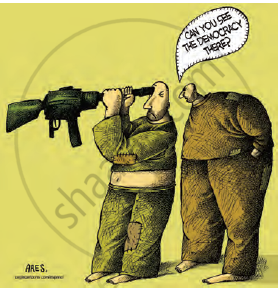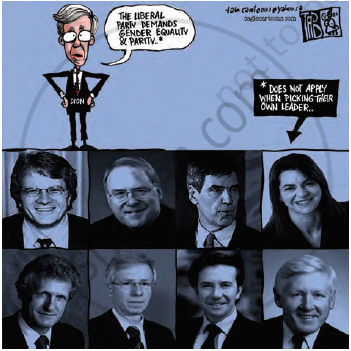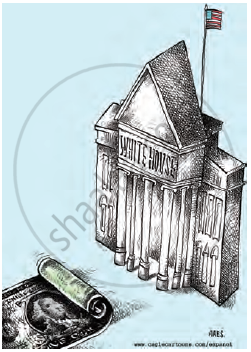Advertisements
Advertisements
प्रश्न
Explain the meaning of transparency in democracy.
उत्तर
Transparency means that every individual belonging to a particular democratic country has the right(RTI) to examine or instigate that whether the laws, plans, action, policies or decisions taken by the government are correct or not and whether they are beneficial to them or not. If a person is unhappy with any decision taken by the government, then he has the right to change that decision.
In a democracy, the government should take decisions after following proper procedures, norms or ways.
APPEARS IN
संबंधित प्रश्न
“A challenge is an opportunity for progress”. Support the statement with your arguments
This cartoon represents a challenge to democracy. Please describe what that challenge is. Also place it in one of the three categories mentioned below.
- foundational challenge to democracy
- challenge of expansion of democracy
- challenge of deepening of democracy

This cartoon represents a challenge to democracy. Please describe what that challenge is. Also place it in one of the three categories mentioned below.
- foundational challenge to democracy
- challenge of expansion of democracy
- challenge of deepening of democracy

This cartoon represents a challenge to democracy. Please describe what that challenge is. Also place it in one of the three categories mentioned below.
- foundational challenge to democracy
- challenge of expansion of democracy
- challenge of deepening of democracy

Write a description of the challenges for democracy in the following situations.
|
Case and Context
|
Your description of the challenges for democracy in that situation |
|
Chile: General Pinochet's government was defeated, but military was still in control of many institutions. |
|
|
Poland: After the first success of solidarity, the government imposed martial law and banned solidarity. |
|
|
Ghana: Just attained independence, Nkrumah elected the President.
|
|
|
Mynamar: Suu Kyi under house arrest for more than 15 years, army rulers getting global acceptance.
|
|
|
International Organisations: US as the only superpower disregards the UN and takes unilateral action. |
|
|
Mexico: Second free election after the defeat of PRI in 2000; defeated candidates alleges rigging. |
|
|
China: The Communist party adopts economic reforms but maintains a monopoly over political power. |
|
|
Pakistan: General Musharraf holds referendum, allegations of fraud in the voter's list. |
|
|
Iraq: Widespread sectarian violence as the new government fails to establish its authority. |
|
|
South Africa: Mandela retires from active politics; pressure on his successor Mbeki to withdraw some concessions given to the white minority. |
|
|
US, Guantanamo Bay: UN Secretary General calls this a violation of international law; US refused to respond. |
|
|
Saudi Arabia: Women were not allowed to take part in public activities, no freedom of religion for the minority. |
|
|
Yugoslavia: Ethnic tension between Serbs and Albanians on the rise in the province of Kosovo; Yugoslavia disintegrated. |
|
|
Belgium: One round of constitutional change taken place, but the Dutch speakers not satisfied; they want more autonomy. |
|
|
Sri Lanka: Peace talks between the government and LTTE breaks down, renewed violence. |
|
|
US, Civil Rights: Blacks have won equal rights, but they are still poor, less educated and marginalised. |
|
|
Northern Ireland: The civil war has ended but Catholics and Protestants yet to develop trust. |
|
|
Nepal: Constituent Assembly about to be elected; unrest in Taraiareas; Maoists have not surrendered arms. |
|
|
Bolivia: Morales, a supporter of water struggle, becomes the Prime Minister, MNC's threaten to leave the country. |
Given below are some spheres or sites of democratic politics. You may place against each of these the specific challenges that you noted for one or more countries or cartoons in the previous section. In addition to that write one item for India for each of these spheres. In case you find that some challenges do not fit into any of the categories given below, you can create new categories and put some items under that.
|
Constitutional design |
|
|
Democratic rights |
|
|
Working of institutions |
|
|
Elections |
|
|
Federalism, decentralization |
|
|
Accommodation of diversity |
|
|
Political Organisation |
|
|
Religious and equality |
Now let us think only about India. Think of all the challenges that democracy faces in contemporary India. List those five that should be addressed first of all. The listing should be in order of priority, i.e, the challenge you find most important or pressing should be mentioned at number 1, and so on. Give one example of that challenge and your reasons for assigning it the priority.
| Priority |
Challenges to democracy |
Example |
Reasons for Preference |
| 1 | |||
| 2 | |||
| 3 | |||
| 4 | |||
| 5 |
Here are some challenges that require political reforms. Discuss these challenges in detail study the reform options offered here and give your preferred solution with reasons. Remember that none of the options offered here is ‘right’ or ‘wrong’. You can opt for a mix of more than one options, or come up with something that is not offered here. But you must give your solution in details and offer reasons for your choice.
| Doctors’ absenteeism Challenge: |
Political funding Challenge: |
| Uttar Pradesh government got a survey done and found out that most of the doctors posted in the rural primary health centres are simply not there. They live in a town, carry out private practice and visit the village where they are posted only once or twice in the entire month. Villagers have to travel to towns and pay very high fee to private doctors even for common ailments. Reform proposals: • The government should make it compulsory for the doctors to live in the village where they are posted, otherwise their service should be terminated. • District administration and police should carry out surprise raids to check the attendance of the doctors. • Village panchayat should be given the power to write the annual report of the doctor which should be read out in the gram sabha meeting. • Problems like this can be solved only if Uttar Pradesh is split into several smaller states which can be administered more efficiently. |
On an average, every candidate who contested the last Lok Sabha elections owned a property of more than Rs one crore. There is a fear that only wealthy people or those with their support can afford to fight elections. Most of the political parties are dependent on money given by big business houses. The worry is that the role of money in politics will reduce whatever little voice the poor have in our democracy. Reform proposals: • The financial accounts of every political party should be made public. These accounts should be examined by government auditors. • There should be state funding of elections. Parties should be given some money by the government to meet their election expenditure. • Citizens should be encouraged to give more donations to parties and to political workers. Such donations should be exempt from income tax. |
Any other problem of your choice
Challenge:
Reform proposals:
•
•
•
Write a description of the challenges for democracy in the following situations.
|
Case and Context
|
Your description of the challenges for democracy in that situation |
|
Mexico: Second free election after the defeat of PRI in 2000; defeated candidates alleges rigging. |
|
|
China: The Communist party adopts economic reforms but maintains a monopoly over political power. |
|
|
Pakistan: General Musharraf holds referendum, allegations of fraud in the voter's list. |
|
|
Iraq: Widespread sectarian violence as the new government fails to establish its authority. |
|
|
South Africa: Mandela retires from active politics; pressure on his successor Mbeki to withdraw some concessions given to the white minority. |
|
|
US, Guantanamo Bay: UN Secretary General calls this a violation of international law; US refused to respond. |
|
|
Saudi Arabia: Women were not allowed to take part in public activities, no freedom of religion for the minority. |
|
|
Yugoslavia: Ethnic tension between Serbs and Albanians on the rise in the province of Kosovo; Yugoslavia disintegrated. |
|
|
Belgium: One round of constitutional change taken place, but the Dutch speakers not satisfied; they want more autonomy. |
|
|
Sri Lanka: Peace talks between the government and LTTE breaks down, renewed violence. |
|
|
US, Civil Rights: Blacks have won equal rights, but they are still poor, less educated and marginalised. |
|
|
Northern Ireland: The civil war has ended but Catholics and Protestants yet to develop trust. |
|
|
Nepal: Constituent Assembly about to be elected; unrest in Taraiareas; Maoists have not surrendered arms. |
|
|
Bolivia: Morales, a supporter of water struggle, becomes the Prime Minister, MNC's threaten to leave the country. |
Explain the meaning of democracy
